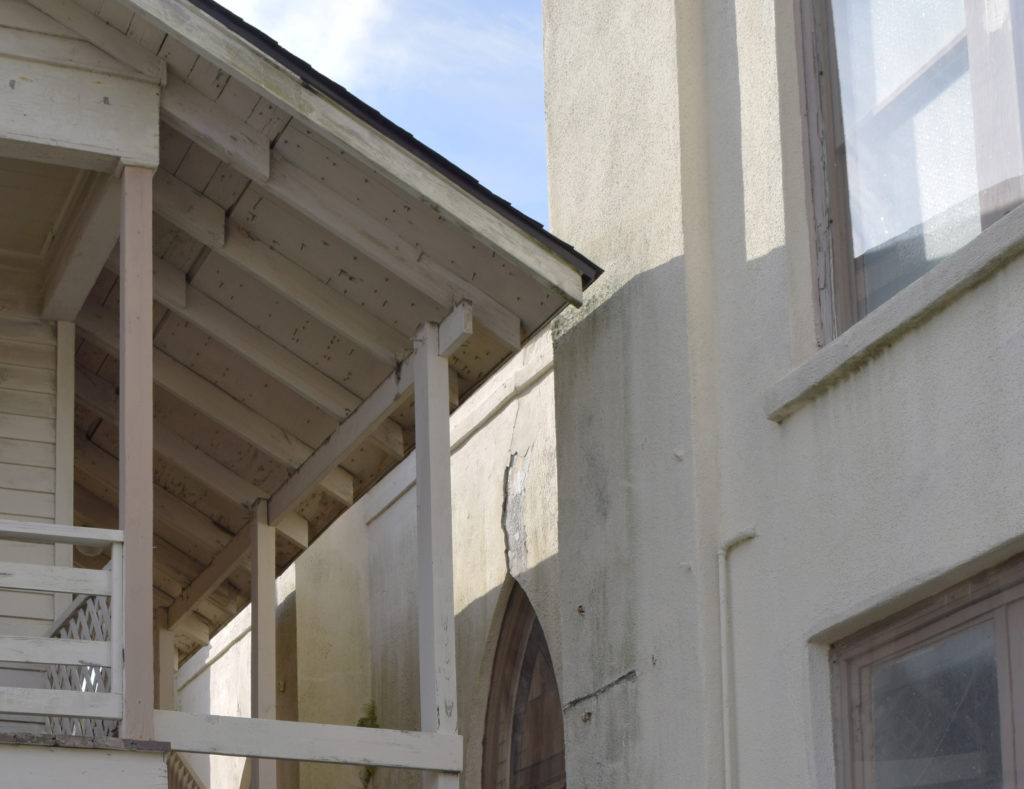Resilience Treatments & Strategies
Surrounding Buildings

Description
Nearby buildings may be part of one complex of historic buildings, all contributing to your property’s significance. Or, they may belong to other property owners. Surrounding buildings might compromise your historic building’s resilience if they are very close (e.g., shedding water onto your building). In urban conditions, adjacent buildings may even be connected, sharing a party wall on the property line. The condition of surrounding buildings can also be a threat (e.g., if parts of them are torn off in a storm and hit your building).
Typical risk factor of this component:
Low
In most settings, surrounding buildings are unlikely to pose a significant threat. However, in high-density areas or cases of very poor maintenance, adjacent buildings can have a moderate impact to your building’s condition.
Typical Damages from Floods or Hurricanes
- Windborne debris generated from loose building materials act as projectiles in high winds
Other common conditions contributing to vulnerability towards floods or hurricanes
- Slope or pitch of adjacent buildings’ assemblies directs water towards or onto your building
- Pest intrusion or mold outbreak afflicting adjacent buildings that can spread to your building
- Landscape grade at adjacent sites channeling water towards your site
Resilience Treatments and Strategies
In-house
For buildings you own, ensure fasteners (e.g., for roofing, siding) are in good condition and rated to withstand high winds. Maintain buildings in good condition (see also NPS Preservation Brief #47).
For buildings beyond your property line, meet with adjacent property owners to discuss reducing vulnerability.
Professional needed [type]
For buildings you own, design and execute improvements necessary to keep buildings in good condition and for good stormwater drainage [architect or engineer].
Treat pest intrusion and mold outbreaks [specialty contractor].
Surrounding Buildings

Description
Nearby buildings may be part of one complex of historic buildings, all contributing to your property’s significance. Or, they may belong to other property owners. Surrounding buildings might compromise your historic building’s resilience if they are very close (e.g., shedding water onto your building). In urban conditions, adjacent buildings may even be connected, sharing a party wall on the property line. The condition of surrounding buildings can also be a threat (e.g., if parts of them are torn off in a storm and hit your building).
Typical risk factor of this component:
Low
In most settings, surrounding buildings are unlikely to pose a significant threat. However, in high-density areas or cases of very poor maintenance, adjacent buildings can have a moderate impact to your building’s condition.
Typical Damages from Floods or Hurricanes
- Windborne debris generated from loose building materials act as projectiles in high winds
Other common conditions contributing to vulnerability towards floods or hurricanes
- Slope or pitch of adjacent buildings’ assemblies directs water towards or onto your building
- Pest intrusion or mold outbreak afflicting adjacent buildings that can spread to your building
- Landscape grade at adjacent sites channeling water towards your site
Resilience Treatments and Strategies
In-house
For buildings you own, ensure fasteners (e.g., for roofing, siding) are in good condition and rated to withstand high winds. Maintain buildings in good condition (see also NPS Preservation Brief #47).
For buildings beyond your property line, meet with adjacent property owners to discuss reducing vulnerability.
Professional needed [type]
For buildings you own, design and execute improvements necessary to keep buildings in good condition and for good stormwater drainage [architect or engineer].
Treat pest intrusion and mold outbreaks [specialty contractor].